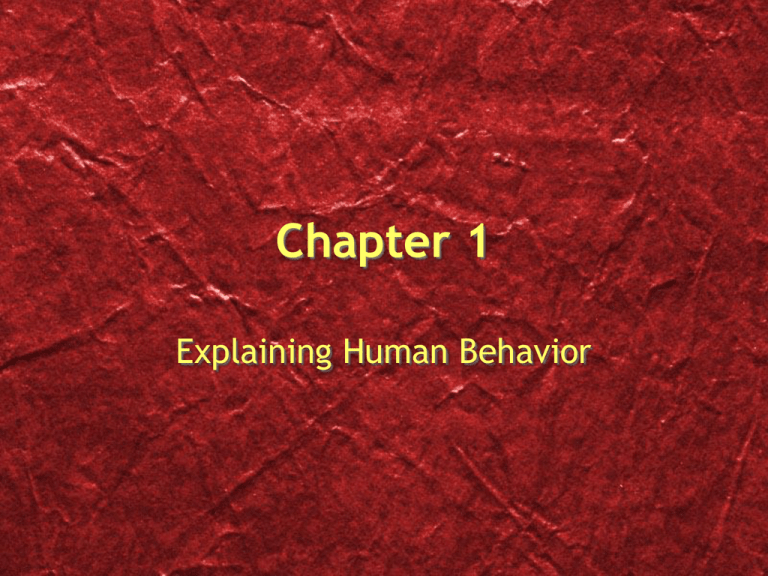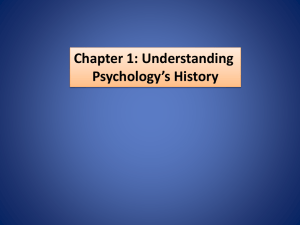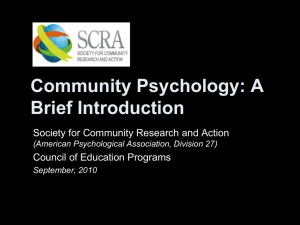Chapter 1
advertisement

Chapter 1 Explaining Human Behavior Objectives • After reading and studying you should be able to: • Explain the difference between scientific psychology and pseudoscience • Define Critical Thinking • Demonstrate critical thinking in approaching problems or questions • Describe the origins of psychology as a formal science Objectives continued • Describe the three basic types of psychologists and their training • Distinguish between psychologists, psychiatrists, psychotherapists, and psychoanalysts. • Describe the five leading psychological approaches. • Apply each of the five leading psychological approaches to some problem or question • Describe humanistic and feminist psychology. Psychology’s Purpose • “The purpose of psychology is to give us a completely different idea of the things we know best.” Paul Valéry Introduction A. Psychology - the scientific study of behavior and mental processes. 1) To examine and explain how humans and animals think, feel, and behave 2) Behavior and mental processes are affected by an organism’s physical state, mental state, and external environment. 3) Psychology is based on empirical evidence, gathered by careful observation, experimentation, and measurement. Introduction B. Pseudoscience and Psychobabble 1) Methods and approaches distinguish psychology from non-science and pseudoscience. Psychology relies on research evidence. 2) The distinction between pseudoscience and psychology is important because major decisions are often based on psychological information. 3) Psychobabble confirms existing beliefs and prejudices; psychology often challenges them. Thinking Critically and Creatively about Psychology A. Critical thinking - the ability and willingness to assess claims and make judgments on the basis of wellsupported reasons and evidence, rather then emotion and anecdote. 1. Critical thinkers look for flaws in arguments and resist poorly supported claims. Thinking Critically and Creatively about Psychology 2. Critical thinkers have the ability to come up with various possible explanations for events. 3. Being open-minded does not mean accepting all opinions as equally valid. B. Critical thinking is fundamental to all science. Thinking Critically and Creatively about Psychology C. There are eight essential guidelines for critical thinking 1. 2. 3. 4. 5. 6. 7. 8. Ask questions; be willing to wonder. Define your terms Examine the evidence. Analyze assumptions and biases. Avoid emotional reasoning. Don’t oversimplify or argue by anecdote. Consider other interpretations. Tolerate uncertainty. Psychology Past and Present A. The goals of psychology are to describe, predict, understand, and modify behavior in order to add to human knowledge and increase human happiness. B. Forerunners of modern psychology were philosophy, natural science, and medicine. Early investigators did not always rely on empirical evidence. The Birth of Modern Psychology A. Psychology as a forma science began in 1879 with Wilhelm Wundt 1) Wundt’s method of trained introspection observation and analysis of one’s own mental experience - rejected as unscientific. 2) Functionalism emphasized the purpose of behavior - how behavior helped adaptation. William James was an early leader. Inspired in part by Charles Darwin’s theory of evolution. The Birth of Modern Psychology B. Psychology as a method of psychotherapy began around 1900 with Sigmund Freud 1. Freud argued that a major portion of human functioning occurs in the unconscious mind. 2. Psychoanalysis is a theory of personality and a method of psychotherapy originally formulated by Freud, which emphasizes unconscious motives and conflicts. Psychology Today A. Psychology is now a complex field with many specialties, perspectives, methods, and training programs. B. Despite the stereotype of the psychologist as psychotherapist, psychology is a highly diverse field. Most professional activity falls into one of three categories… Psychology Today 1. Psychological research, including a) b) Basic psychology, the study of psychological issues in order to seek knowledge for its own sake rather than for its practical application, and Applied psychology, the study of psychological issues that have direct practical significance and the application of psychological findings. Psychology Today 2. Psychological practice, attempts to understand and improve physical and mental health. Practitioners include counseling, clinical, and school psychologists. People often confuse the term clinical psychologist with: a) Psychotherapist - anyone who does any kind of psychological therapy (only some of whom are clinical psychologists) Psychology Today a) Psychoanalyst - persons who practice one specialized form of therapy (psychoanalysis). Some but not all are psychologists. b) Psychiatrists - medical specialists concerned with mental disorders. Psychiatrists are not psychologists. C. Psychology in the Community - people who apply psychological research in various settings.








